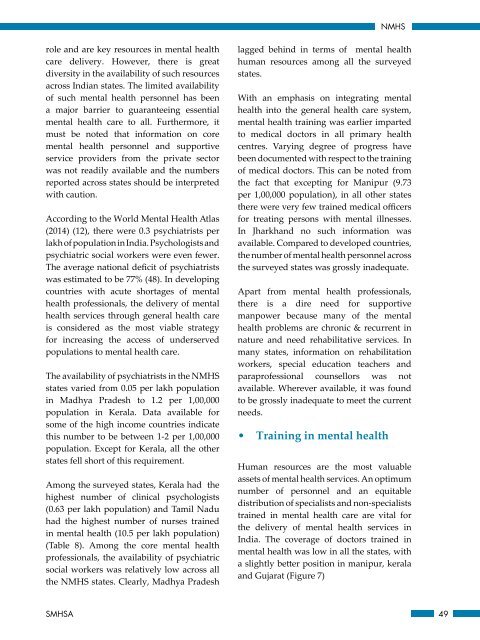National Mental Health Survey of India 2015-16
NMHS%20Report%20%28Mental%20Health%20Systems%29%201
NMHS%20Report%20%28Mental%20Health%20Systems%29%201
Create successful ePaper yourself
Turn your PDF publications into a flip-book with our unique Google optimized e-Paper software.
NMHS<br />
role and are key resources in mental health<br />
care delivery. However, there is great<br />
diversity in the availability <strong>of</strong> such resources<br />
across <strong>India</strong>n states. The limited availability<br />
<strong>of</strong> such mental health personnel has been<br />
a major barrier to guaranteeing essential<br />
mental health care to all. Furthermore, it<br />
must be noted that information on core<br />
mental health personnel and supportive<br />
service providers from the private sector<br />
was not readily available and the numbers<br />
reported across states should be interpreted<br />
with caution.<br />
According to the World <strong>Mental</strong> <strong>Health</strong> Atlas<br />
(2014) (12), there were 0.3 psychiatrists per<br />
lakh <strong>of</strong> population in <strong>India</strong>. Psychologists and<br />
psychiatric social workers were even fewer.<br />
The average national deficit <strong>of</strong> psychiatrists<br />
was estimated to be 77% (48). In developing<br />
countries with acute shortages <strong>of</strong> mental<br />
health pr<strong>of</strong>essionals, the delivery <strong>of</strong> mental<br />
health services through general health care<br />
is considered as the most viable strategy<br />
for increasing the access <strong>of</strong> underserved<br />
populations to mental health care.<br />
The availability <strong>of</strong> psychiatrists in the NMHS<br />
states varied from 0.05 per lakh population<br />
in Madhya Pradesh to 1.2 per 1,00,000<br />
population in Kerala. Data available for<br />
some <strong>of</strong> the high income countries indicate<br />
this number to be between 1-2 per 1,00,000<br />
population. Except for Kerala, all the other<br />
states fell short <strong>of</strong> this requirement.<br />
Among the surveyed states, Kerala had the<br />
highest number <strong>of</strong> clinical psychologists<br />
(0.63 per lakh population) and Tamil Nadu<br />
had the highest number <strong>of</strong> nurses trained<br />
in mental health (10.5 per lakh population)<br />
(Table 8). Among the core mental health<br />
pr<strong>of</strong>essionals, the availability <strong>of</strong> psychiatric<br />
social workers was relatively low across all<br />
the NMHS states. Clearly, Madhya Pradesh<br />
lagged behind in terms <strong>of</strong> mental health<br />
human resources among all the surveyed<br />
states.<br />
With an emphasis on integrating mental<br />
health into the general health care system,<br />
mental health training was earlier imparted<br />
to medical doctors in all primary health<br />
centres. Varying degree <strong>of</strong> progress have<br />
been documented with respect to the training<br />
<strong>of</strong> medical doctors. This can be noted from<br />
the fact that excepting for Manipur (9.73<br />
per 1,00,000 population), in all other states<br />
there were very few trained medical <strong>of</strong>ficers<br />
for treating persons with mental illnesses.<br />
In Jharkhand no such information was<br />
available. Compared to developed countries,<br />
the number <strong>of</strong> mental health personnel across<br />
the surveyed states was grossly inadequate.<br />
Apart from mental health pr<strong>of</strong>essionals,<br />
there is a dire need for supportive<br />
manpower because many <strong>of</strong> the mental<br />
health problems are chronic & recurrent in<br />
nature and need rehabilitative services. In<br />
many states, information on rehabilitation<br />
workers, special education teachers and<br />
parapr<strong>of</strong>essional counsellors was not<br />
available. Wherever available, it was found<br />
to be grossly inadequate to meet the current<br />
needs.<br />
• Training in mental health<br />
Human resources are the most valuable<br />
assets <strong>of</strong> mental health services. An optimum<br />
number <strong>of</strong> personnel and an equitable<br />
distribution <strong>of</strong> specialists and non-specialists<br />
trained in mental health care are vital for<br />
the delivery <strong>of</strong> mental health services in<br />
<strong>India</strong>. The coverage <strong>of</strong> doctors trained in<br />
mental health was low in all the states, with<br />
a slightly better position in manipur, kerala<br />
and Gujarat (Figure 7)<br />
SMHSA<br />
49


